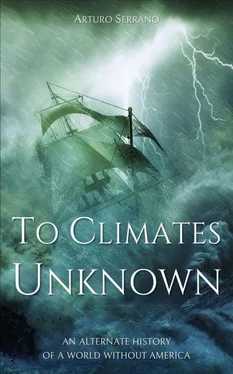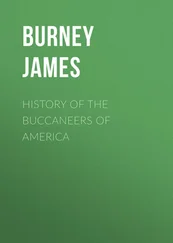Night, May 16 (Gregorian), 1756
Santos
Sorting through the chests and boxes piled up in the house took the better part of the week. Some of Father Bartolomeu’s brothers had also been priests and arranged, like him, for their childhood home in Brazil to be the destination of their personal effects.
Godin was amazed that men who lived by the vow of poverty could accumulate so much. “This trip could’ve been avoided,” he said as he relocated a stack of folders. “The drawings could have been sent to a library in Lisbon if the Church hadn’t gone into panic over them.”
“Panic is what Inquisitors are supposed to do,” said Mutis with a tired voice. “We’re besieged by every kind of heretic. You can’t blame the Church for staying vigilant.”
“What do we need vigilance for? The Turks haven’t attacked Christendom in decades.”
Without pausing his search, Mutis replied, “If the Turks have stopped bothering us, it’s only because the Great Ming’s infernal carriages keep them occupied.”
“If we don’t find anything,” said Godin as he lifted his head out of a trunk, “all that zeal will be to blame.”
Mutis closed the notebook he’d just finished browsing, set it aside, and opened the next one. “If we don’t find anything, it’ll be because God didn’t want us to.”
Godin decided to drop that topic, which could only lead to trouble, and said instead, “José, have you seen paper as old as this?”
“Let me see it.” Mutis took it carefully in his hands. “You can barely make out the shape of the sail.”
“I know it’s faded, but do you recognize the etching?”
Mutis nodded. It certainly looked like a structure they had found in Bartolomeu’s notes. “It’s one of the earlier designs he discarded.”
“But the paper itself cannot have been his; it’s at least a century old.”
Mutis turned it around. “Bartolomeu made annotations here. May I have my magnifying glass?”
“As soon as I remember where I left it.” Godin took hesitant steps between old leather bags, broken alchemical instruments, a portable chalkboard, an unrolled map of Portugal, a fish preserved in a jar, a case full of thin glass tubes, several dozen Bibles, and a large, rusty mechanical clock to reach the desk where, earlier that day, Mutis had been examining some dried leaves that had fancied his curiosity. Godin extended his hand from where he stood, toppling an inkwell full of cobwebs, a tiny horse head made of ivory, and a bent candleholder to grab the magnifying glass before returning to where Mutis was sitting.
“Thank you. Let’s see… this portion is definitely Bartolomeu’s handwriting.”
“Does it say anything important?”
“A name: ‘Lana de Terzi.’ I think I saw a mention of this name in Bartolomeu’s notebook.” He put the glass down and gestured at the disorganized room they were in. “Of course, the question of why he wanted to keep this specific page remains open.”
Godin sat on a bed and started fumbling among the items behind him. “We’ve lost entire days in this—” a fit of cough cut his words short. He’d just taken a dusty tome from underneath a pile of discarded clothes.
Mutis waved the dust from this sight and glanced at the cover. “ Décadas da Ásia . I know that one.”
“History?”
“Yes. Mostly Portuguese.”
Godin coughed some more before asking, “Is it interesting?”
“It’s very complete, but I wouldn’t lose time in studying it now. Its content is not exactly relevant to our present problem.”
“I dispute that,” said Godin, as he drew a handful of loose sheets from within the book’s cover.
Mutis opened his eyes wide. “Is that…?”
Godin spread the papers on the floor, straightening the wrinkles with care not to break the precious drawings. “Indeed. This is the design he completed.”
Knowing that the question was redundant, but still needing to hear someone voice the answer, Mutis asked, “What’s the queen going to do with it?”
“Build it, of course. And go to war.”
Mutis looked at the machine, which resembled others they’d seen during their research, but this version contained more notes, explanations, measurements, and instructions. “Something so beautiful, turned into a weapon.”
“That’s what’s beautiful about it.”
“I was thinking you’d prefer to use it to get a better view of the sky.”
The idea seemed to please Godin. “That would be useful; I’ll grant that. But this, José,” he pointed at the papers, “is how we’re going to kick the Dutch out of Brazil and the Danish out of the southern tip. This is how we’re going to reconquer the colonies that have declared independence. This is how we’re going to claim the world for Spain.”
Midnight, June 2 (Gregorian), 1756
Atlantic Ocean
Mars had gone below the horizon, but Jupiter was clear and bright, three of its satellites fully visible. At the other side of the sky, Saturn and its crown shone mysterious in the moonless night. With Godin’s telescope, Mutis had tried his hand at the observation of the heavenly bodies, finding them more interesting than he’d expected. They were on a ship bound for Lisbon, relieved that they’d succeeded at finding the information the queen had demanded, but apprehensive about the fact that they weren’t relying on the Dutch to keep them safe this time. On that matter Godin had insisted, and Mutis had, after lengthy discussion, had to admit, that they couldn’t board an enemy ship with the secret they were carrying. They told themselves that they would have to trust that their return was pleasing to God, but after the earthquake, such reassurances were no longer enough. Stargazing had become their main means of distraction from the sense of dread that followed them all the time.
“How many moons does Saturn have?” asked Mutis, as entranced by the halo surrounding the planet as every observer since Galileo.
“Five. But it wouldn’t surprise me if more are found.”
He looked at Jupiter again. “Which moon am I not seeing?”
“Its name is Io. Give it a few hours; it’ll show up.”
Mutis put down the telescope. “How do you even tell them apart?”
The question made Godin chuckle. “How do you tell varicella and variola apart?”
“Oh, they look nothing alike.”
“I wouldn’t know about that. But to me,” said Godin, pointing his finger up, “each of those dots of light might as well have its own face.”
Mutis put the telescope to his eye again. “Well, God may know each star by name, but I only know one. Where’s Polaris?”
“That’s to the north, of course.” Then, seeing what his partner actually meant, he added, “North is that way.” While Mutis changed his position, he took his notebook from his satchel, consulted his calculations for that month, and compared them to the visible constellations. “We’ve already crossed the equator, so Polaris must be visible by now, even more so given that we’re in summer. But it’s going to be very close to the horizon.”
Lowering the telescope to the northern horizon, Mutis searched for the north star, unable to ascertain which of the millions of lights it could be. “All I see is waves.”
“Look for a group of stars arranged like this,” said Godin, holding a lantern over his notebook. “Polaris is the last in this line.”
Mutis nodded and looked again. “I see nothing that looks like that drawing.”
“Tell me what you see.”
“I’m seeing the edge of the sea, and… an entire family of flying fish just jumped.”
“Just now?”
Mutis shrugged. “They must be running from a shark.”
Godin took the telescope, followed the shape of Ursa Minor to its end, almost touching the horizon, and saw, too, the fish jump. “Something is disturbing the fish.” He followed the trail of the fish and saw a piece of driftwood moving slowly.
Читать дальше












